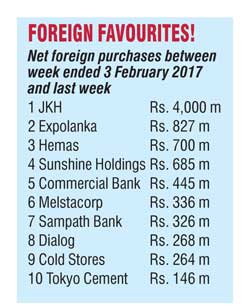Sri Lankan shares rose for the tenth straight session on Tuesday to close at their highest in nearly four months, helped by positive sentiment over continued foreign buying in blue chip stocks.
The market has seen fund inflows for 15 straight sessions through Tuesday, with foreign investors buying net 4.9 billion worth of equities in the same period.
They net bought shares worth 49 million rupees ($323,163) on Tuesday, raising the year-to-date net foreign inflow into equities to 7.39 billion rupees.
The Colombo stock index ended 0.2 percent firmer at 6,305.54, its highest close since Dec. 9. The index rose 3.8 percent last week, posting its second weekly gain in seven.
The index has climbed 5.53 percent in the last ten sessions through Tuesday.
"It was a dull day as most of the investors are on holiday ahead of the new year," said Atchuthan Srirangan, a senior research analyst with First Capital Holdings PLC.
"Foreign investors are active and the market is up."
Sri Lanka will celebrate its traditional new year this week and the markets will be closed on Thursday and Friday.
However, turnover stood at 281.6 million rupees, its lowest since March 21 and well below this year's daily average of 757.3 million rupees.
Shares of conglomerate John Keells Holdings Plc rose 1 percent, while Lanka ORIX leasing Company Plc rose 1.16 percent.
The market has seen fund inflows for 15 straight sessions through Tuesday, with foreign investors buying net 4.9 billion worth of equities in the same period.
They net bought shares worth 49 million rupees ($323,163) on Tuesday, raising the year-to-date net foreign inflow into equities to 7.39 billion rupees.
The Colombo stock index ended 0.2 percent firmer at 6,305.54, its highest close since Dec. 9. The index rose 3.8 percent last week, posting its second weekly gain in seven.
The index has climbed 5.53 percent in the last ten sessions through Tuesday.
"It was a dull day as most of the investors are on holiday ahead of the new year," said Atchuthan Srirangan, a senior research analyst with First Capital Holdings PLC.
"Foreign investors are active and the market is up."
Sri Lanka will celebrate its traditional new year this week and the markets will be closed on Thursday and Friday.
However, turnover stood at 281.6 million rupees, its lowest since March 21 and well below this year's daily average of 757.3 million rupees.
Shares of conglomerate John Keells Holdings Plc rose 1 percent, while Lanka ORIX leasing Company Plc rose 1.16 percent.
($1 = 151.7500 Sri Lankan rupees)
(Reporting by Ranga Sirilal and Shihar Aneez)
